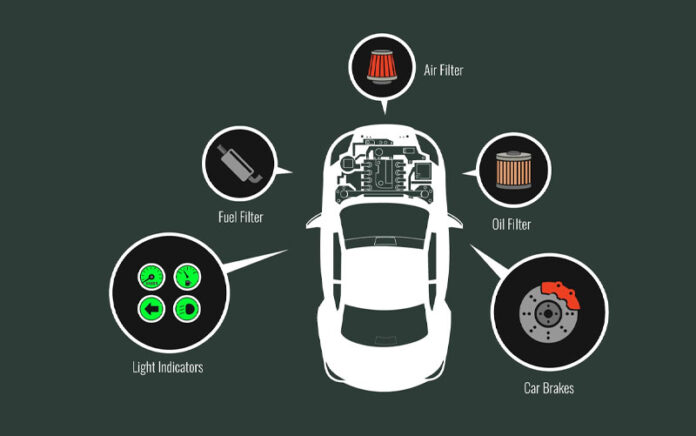Are you a car owner looking to keep your vehicle in top shape? Proper car maintenance is essential for ensuring its longevity and performance.
In this article, we will explore the top 10 must-know tips for car maintenance that will help you keep your vehicle running smoothly and avoid costly repairs down the road. So, let’s dive in!
1. Regular Oil Changes: The Lifeblood of Your Engine
Just like how we need fresh air to breathe, your engine needs clean oil to operate efficiently. Regular oil changes are crucial for maintaining engine health and maximizing performance. Oil lubricates the engine’s moving parts, reduces friction, and keeps it cool. Be sure to follow the manufacturer’s recommendations for oil change intervals and use the recommended oil type for your vehicle.
2. Check and Maintain Fluid Levels
Fluids play a vital role in the proper functioning of your car’s various systems. Regularly check and maintain the levels of essential fluids such as coolant, brake fluid, power steering fluid, and transmission fluid. Low levels or contaminated fluids can lead to system malfunctions and costly repairs. Refer to your owner’s manual to identify the specific locations of fluid reservoirs and the recommended fluid types.
3. Keep Your Tires in Good Condition
Your tires are the only contact point between your car and the road, making them a critical safety component. Regularly inspect the tire pressure, tread depth, and overall condition of your tires. Underinflated or worn-out tires can affect fuel efficiency, handling, and braking performance. Rotate your tires regularly and ensure proper wheel alignment for even wear and extended tire life.
4. Battery Care: Avoid Getting Stranded
A dead battery can leave you stranded in the middle of nowhere. To avoid such unpleasant situations, inspect your battery regularly and clean any corrosion from the terminals. Check the battery’s voltage and ensure it is within the manufacturer’s specifications. If your battery is more than three years old, consider getting it tested or replaced to prevent unexpected breakdowns.
5. Keep Your Brakes in Check
Properly functioning brakes are crucial for your safety on the road. Pay attention to signs of brake wear such as squeaking or grinding noises, vibrations, or a soft brake pedal. Inspect your brake pads, rotors, and brake fluid regularly. If you notice any issues or have concerns about your braking system, have it inspected by a qualified mechanic as soon as possible.
6. Maintain a Clean and Functional Air Filter
A clean air filter is essential for the optimal performance of your car’s engine. It prevents dirt, debris, and contaminants from entering the engine, ensuring efficient combustion and reducing strain on the engine. Check your air filter regularly and replace it if it’s dirty or clogged. A clogged air filter can negatively impact fuel efficiency and engine power.
7. Regularly Inspect and Replace Worn-out Belts and Hoses
Belts and hoses play a vital role in powering various systems in your car, such as the alternator, power steering, and cooling system. Over time, they can become worn or damaged, leading to system failures and potential engine damage. Regularly inspect the condition of belts and hoses and replace them if they show signs of wear, cracking, or leakage.
8. Pay Attention to Warning Lights
Modern cars are equipped with a range of warning lights that indicate potential issues with various systems. Don’t ignore these warning lights. They serve as early indicators of problems that need attention. If a warning light illuminates on your dashboard, consult your owner’s manual or seek professional help to diagnose and address the underlying issue promptly.
9. Keep Your Car Clean and Protected
Regularly washing and waxing your car not only keeps it looking good but also helps protect the paint and body from corrosion and damage. Use high-quality car care products that are safe for your vehicle’s specific finish. Additionally, consider using a car cover if you park your car outdoors for extended periods to shield it from the elements and prevent sun damage.
10. Follow the Recommended Service Schedule
Last but not least, follow the recommended service schedule outlined in your owner’s manual. It guides when to perform routine maintenance tasks such as oil changes, filter replacements, and inspections. Adhering to the recommended service intervals ensures that your car receives the necessary care at the right time, keeping it in optimal condition.
Tips for Effective Car Maintenance
- Create a Maintenance Schedule: Develop a regular maintenance schedule based on your vehicle’s manufacturer recommendations. This will help you stay organized and ensure that important tasks are not overlooked.
- Keep Records: Maintain a record of all maintenance and repairs performed on your car. This will help you track the history of your vehicle and provide valuable information when selling or trading it in the future.
- Pay Attention to Unusual Noises: If you notice any unusual noises, such as squeaks, rattles, or grinding sounds, don’t ignore them. Unusual noises can be early indicators of underlying issues that need attention.
- Monitor Tire Pressure: Check your tire pressure regularly and maintain the recommended levels. Underinflated or overinflated tires can affect handling, fuel efficiency, and tire wear.
- Inspect Lights and Signals: Routinely check your headlights, taillights, brake lights, and turn signals to ensure they are functioning properly. Replace any burnt-out bulbs promptly.
- Use Quality Fuel: Fill up your car with high-quality fuel to ensure optimal engine performance and fuel efficiency. Avoid using low-quality or contaminated fuel, as it can negatively impact your car’s performance.
- Drive Smoothly: Practice smooth driving habits, such as gradual acceleration and gentle braking. Aggressive driving can put unnecessary strain on your car’s components and reduce fuel efficiency.
- Protect Your Car from Extreme Weather: If you live in an area with extreme weather conditions, take steps to protect your car. For example, use a windshield sunshade in hot weather to prevent interior damage and park in a covered area during hailstorms.
- Regularly Check and Replace Wiper Blades: Worn-out wiper blades can impair visibility during rainy or snowy weather. Inspect your wiper blades regularly and replace them if they show signs of deterioration or streaking.
- Seek Professional Help: While it’s essential to perform basic maintenance tasks yourself, don’t hesitate to seek professional help when needed. Qualified mechanics have the expertise and equipment to diagnose and address complex issues effectively.
Conclusion
Proper car maintenance is essential for keeping your vehicle in excellent condition and ensuring your safety on the road. By following these top 10 must-know tips for car maintenance, you can extend the lifespan of your car, improve its performance, and minimize the risk of unexpected breakdowns or costly repairs.
Remember, a well-maintained car not only runs smoothly but also provides you with peace of mind. So, take care of your car, and it will take care of you. Safe driving!
FAQs
How often should I change my oil?
The frequency of oil changes depends on several factors, including the type of oil used and driving conditions. As a general guideline, most vehicles require an oil change every 5,000 to 7,500 miles or every six months. However, it’s best to consult your vehicle’s owner’s manual for the manufacturer’s recommended oil change intervals.
How can I improve my car’s fuel efficiency?
To improve fuel efficiency, you can follow these tips:
- Keep your tires properly inflated.
- Avoid aggressive driving and rapid acceleration.
- Remove unnecessary weight from your car.
- Use the recommended grade of motor oil.
- Keep up with regular maintenance, including air filter replacements and spark plug inspections.
How often should I rotate my tires?
It’s generally recommended to rotate your tires every 5,000 to 7,500 miles or during every other oil change. Rotating the tires helps ensure even wear and extends their lifespan.
How do I know if my car’s battery needs to be replaced?
Signs of a failing battery include difficulty starting the engine, dimming headlights, and a clicking sound when you turn the key. If you experience any of these symptoms, it’s advisable to have your battery tested by a professional to determine if it needs replacement.
Can I perform car maintenance tasks myself, or should I always go to a mechanic?
Many routine maintenance tasks, such as checking fluid levels, replacing wiper blades, and inspecting lights, can be done by car owners themselves. However, for more complex repairs or diagnostics, it’s recommended to seek the expertise of a qualified mechanic to ensure the job is done correctly.
Is it necessary to follow the recommended service schedule in the owner’s manual?
Yes, following the recommended service schedule is crucial for maintaining your car’s warranty and optimal performance. The service schedule outlines the manufacturer’s guidelines for regular maintenance tasks and inspections, which help prevent potential issues and keep your car in good condition.







